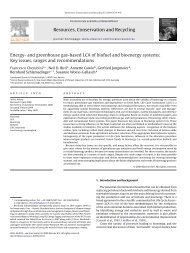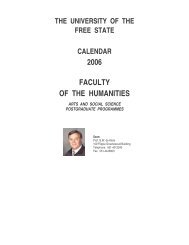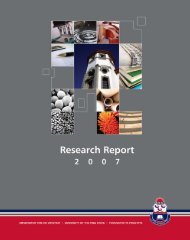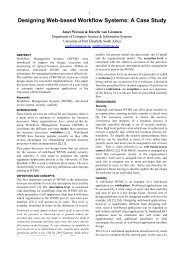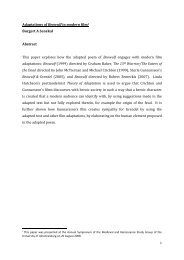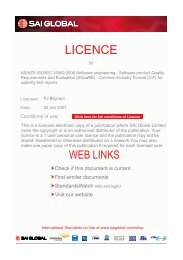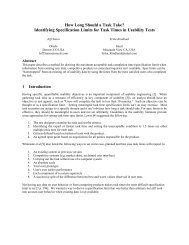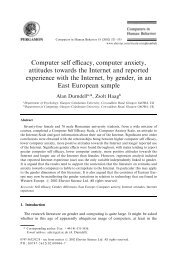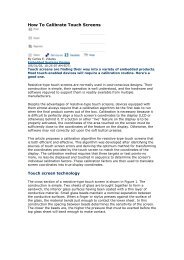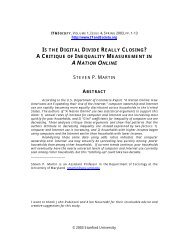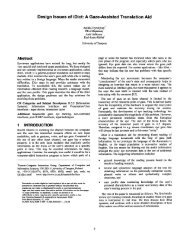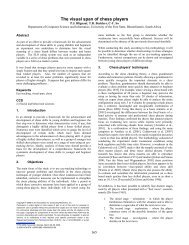the role of livestock in developing communities: enhancing ...
the role of livestock in developing communities: enhancing ...
the role of livestock in developing communities: enhancing ...
You also want an ePaper? Increase the reach of your titles
YUMPU automatically turns print PDFs into web optimized ePapers that Google loves.
The ‘tragedy <strong>of</strong> <strong>the</strong> commons’?<br />
Graz<strong>in</strong>g <strong>of</strong> <strong>livestock</strong> <strong>in</strong> many rural areas are on communally owned lands. The “tragedy <strong>of</strong> <strong>the</strong> commons” is<br />
well known, with a generalised application to ‘open access’ communal graz<strong>in</strong>g resources, where ecologically<br />
determ<strong>in</strong>ed carry<strong>in</strong>g capacity rates are transgressed. This, it is argued, is because <strong>the</strong> marg<strong>in</strong>al cost <strong>of</strong> such<br />
‘over’ graz<strong>in</strong>g to <strong>the</strong> <strong>in</strong>dividual <strong>livestock</strong> owner on <strong>the</strong> commons does not fully reflect <strong>the</strong> marg<strong>in</strong>al cost to<br />
<strong>the</strong> community at large, result<strong>in</strong>g <strong>in</strong> susta<strong>in</strong>ed overgraz<strong>in</strong>g <strong>in</strong>centives.<br />
Reality, however, is less clear. In situations <strong>of</strong> strong social cohesion, where access to communal graz<strong>in</strong>g<br />
resources is managed, sound graz<strong>in</strong>g and <strong>livestock</strong> husbandry practices could be implemented, with good<br />
susta<strong>in</strong>able results. Livestock improvement schemes <strong>in</strong>troduced under such regimes succeeded <strong>in</strong> general<br />
and resulted <strong>in</strong> <strong>the</strong> evenly distributed improvement <strong>of</strong> participants’ livelihoods.<br />
In o<strong>the</strong>r cases however, uneven power relations could exploit unclear/unspecified/open type communal<br />
graz<strong>in</strong>g arrangements on <strong>the</strong> commons. This led to opportunistic behaviour and <strong>the</strong> skewed distribution<br />
<strong>of</strong> benefits to such ‘powerful elites’ <strong>in</strong> <strong>the</strong> community.<br />
In a study <strong>in</strong> <strong>the</strong> (now) Limpopo prov<strong>in</strong>ce <strong>of</strong> South Africa (V<strong>in</strong>k, 1986), where <strong>the</strong> highly skew <strong>livestock</strong><br />
ownership status and distribution <strong>of</strong> resultant benefits <strong>in</strong> communal graz<strong>in</strong>g areas was <strong>in</strong>vestigated, it was<br />
concluded that <strong>the</strong> “tragedy <strong>of</strong> <strong>the</strong> commons” existed, with ‘overgraz<strong>in</strong>g’ <strong>of</strong> <strong>the</strong> commons apparent over<br />
a broad base. This situation was found to be <strong>the</strong> direct result <strong>of</strong> <strong>the</strong> “tragedy <strong>of</strong> <strong>the</strong> chiefs and <strong>the</strong>ir cronies”,<br />
i.e. powerful groups which exploited <strong>the</strong> common graz<strong>in</strong>g resources, with ever <strong>in</strong>creas<strong>in</strong>g <strong>livestock</strong><br />
herds graz<strong>in</strong>g <strong>in</strong> an open access regime with no enforceable graz<strong>in</strong>g and animal husbandry management<br />
arrangements. This resulted <strong>in</strong> <strong>the</strong> susta<strong>in</strong>ed over exploitation <strong>of</strong> <strong>the</strong> natural resource base <strong>of</strong> <strong>the</strong> community,<br />
which rendered <strong>livestock</strong> improvement schemes environmentally unsusta<strong>in</strong>able, while also largely<br />
<strong>in</strong>equitable and beneficial to only a small, powerful m<strong>in</strong>ority.<br />
Understand<strong>in</strong>g <strong>in</strong>stitutional structure and <strong>the</strong> impact on economic decision-mak<strong>in</strong>g must be viewed as an<br />
important parameter <strong>in</strong> <strong>the</strong> design <strong>of</strong> <strong>livestock</strong> development <strong>in</strong>terventions. In addition, appropriate policy<br />
frameworks, supportive <strong>in</strong>stitutions and “relevant” science is required to ensure success (Stroebel, 2004;<br />
Nthakheni, 2007). Ensur<strong>in</strong>g <strong>the</strong> success <strong>of</strong> <strong>in</strong>dividual projects and susta<strong>in</strong>able development <strong>in</strong>volves a number<br />
<strong>of</strong> issues:<br />
• Clear mandates and efforts <strong>of</strong> <strong>in</strong>stitutions participat<strong>in</strong>g <strong>in</strong> <strong>the</strong> research and development (R&D)<br />
• Clear identification <strong>of</strong> <strong>the</strong> bio-physical environment, problems, needs and priorities<br />
• Ensur<strong>in</strong>g effective development dialogue and <strong>in</strong>novative processes between all partners and<br />
also <strong>communities</strong><br />
• Application <strong>of</strong> <strong>in</strong>terdiscipl<strong>in</strong>ary R&D and system perspectives<br />
• Measurement <strong>of</strong> progress and impacts, and<br />
• Striv<strong>in</strong>g cont<strong>in</strong>uously towards shared goals and susta<strong>in</strong>able development.<br />
The comprehensive review <strong>of</strong> <strong>the</strong> current “<strong>livestock</strong> <strong>in</strong> develop<strong>in</strong>g <strong>communities</strong>” paradigm is now required.<br />
This satellite symposium provided <strong>the</strong> opportunity for a unique knowledge network to share experiences<br />
and ideas on how to enhance multifunctionality <strong>in</strong> <strong>livestock</strong> development. The comprehensive understand<strong>in</strong>g<br />
<strong>of</strong> this concept must be viewed as one <strong>of</strong> <strong>the</strong> cornerstones to ‘build’ such a new paradigm and <strong>in</strong> do<strong>in</strong>g<br />
so, to provide <strong>the</strong> urgently needed <strong>in</strong>tellectual framework for deal<strong>in</strong>g with <strong>the</strong> many formidable challenges<br />
fac<strong>in</strong>g this important sector <strong>in</strong> most develop<strong>in</strong>g environments.<br />
6<br />
Proceed<strong>in</strong>gs <strong>of</strong> <strong>the</strong> Satellite Symposium: WCAP



